
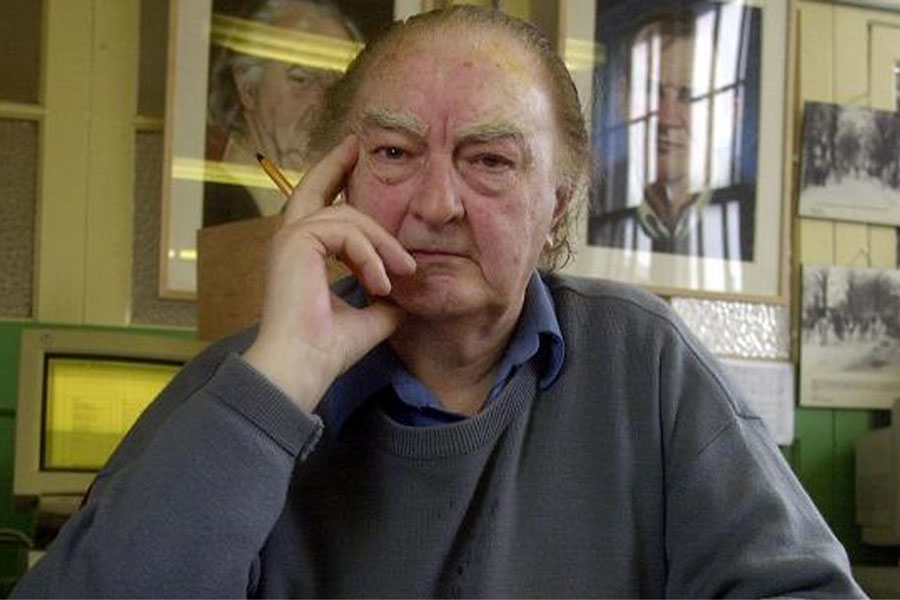
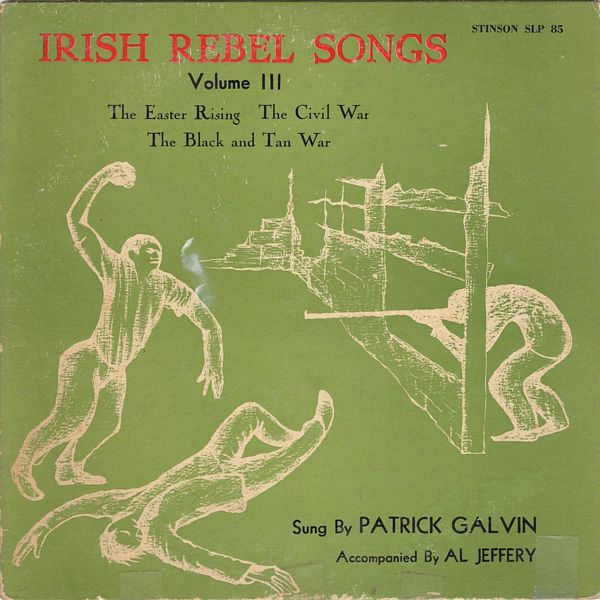 |
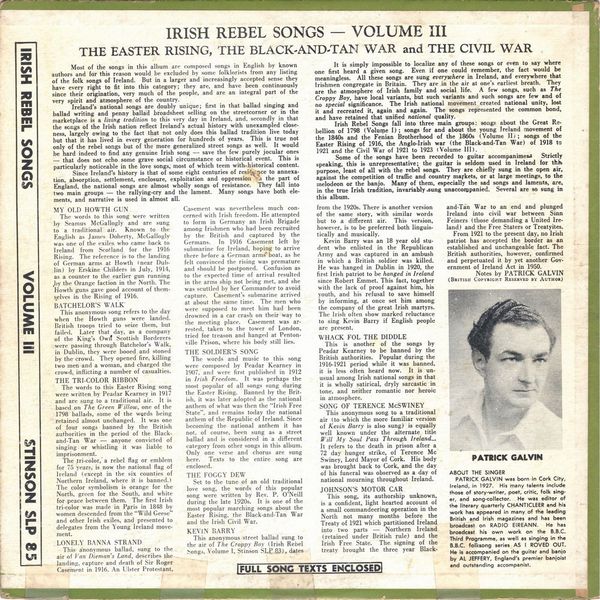
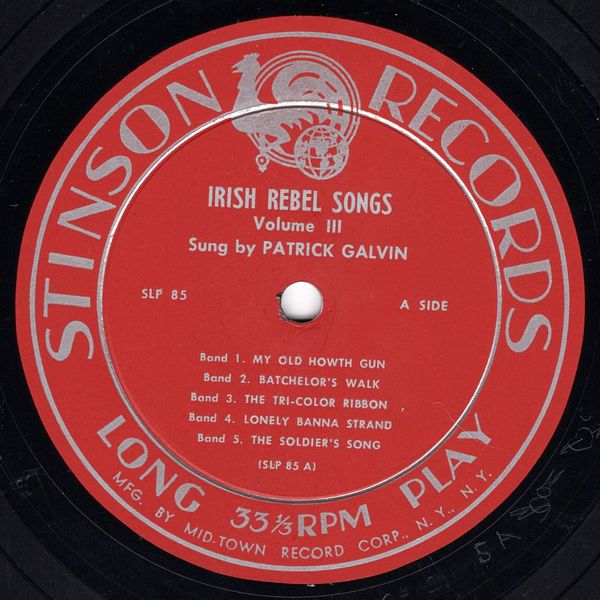
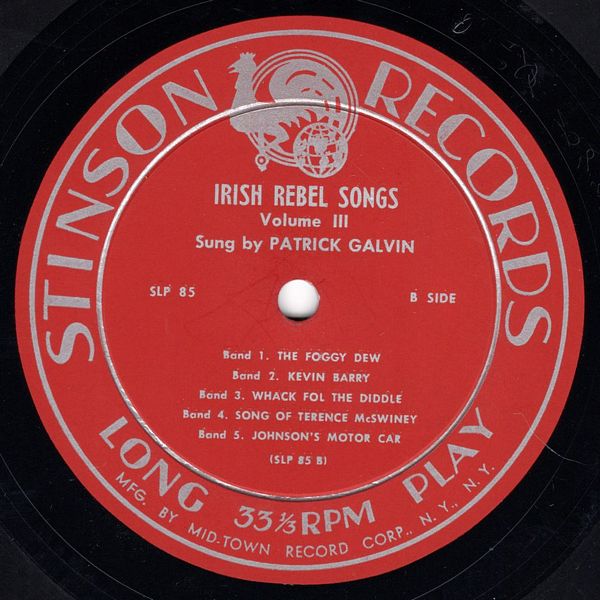 |
Sleeve Notes
Most of the songs in this album are composed songs in English by known authors and for this reason would be excluded by some folklorists from any listing of the folk songs of Ireland. But in a larger and increasingly accepted sense they have every right to fit into this category; they are, and have been continuously since their origination, very much of the people, and are an integral part of the very spirit and atmosphere of the country.
Ireland's national songs are doubly unique; first in that ballad singing and ballad writing and penny ballad broadsheet selling on the street-corner or in the marketplace is a living tradition to this very day in Ireland, and, secondly in that the songs of the Irish nation reflect Ireland's actual history with unexampled closeness, largely owing to the fact that not only does this ballad tradition live today but that it has lived in every generation for hundreds of years. This is true not only of the rebel songs but of the more generalized street songs as well. It would be hard indeed to find any genuine Irish song — save the few purely jocular ones — that does not echo some grave social circumstance or historical event. This is particularly noticeable in the love songs, most of which teem with historical content.
Since Ireland's history is that of some eight centuries of resistance to annexation, absorption, settlement, enclosure, exploitation and oppression on the part of England, the national songs are almost wholly songs of resistance. They fall into two main groups — the rallying-cry and the lament. Many songs have both elements, and narrative is used in almost all.
It is simply impossible to localize any of these songs or even to say where one first heard a given song. Even if one could remember, the fact would be meaningless. All these songs are sung everywhere in Ireland, and everywhere that Irishmen congregate in Britain. They are in the air at one's earliest breath. They are the atmosphere of Irish family and social life. A few songs, such as The Croppy Boy, have local variants, but such variants and such songs are few and of no special significance. The Irish national movement created national unity, lost it and recreated it, again and again. The songs represented the common bond, and have retained that unified national quality.
Irish Rebel Songs fall into three main groups: songs about the Great Rebellion of 1798 (Volume I) songs for and about the young Ireland movement of the 1840s and the Fenian Brotherhood of the 1860s (Volume II) songs of the Easter Rising of 1916, the Anglo-Irish war (the Black-and-Tan War) of 1918 to 1921 and the Civil War of 1921 to 1923 (Volume III).
Some of the songs have been recorded to guitar accompaniment Strictly speaking, this is unrepresentative; the guitar is seldom used in Ireland for this purpose, least of all with the rebel songs. They are chiefly sung in the open air, against the competition of traffic and country markets, or at large meetings, to the melodeon or the banjo. Many of them, especially the sad songs and laments, are, in the true Irish tradition, invariably sung unaccompanied. Several are so sung in this album.
MY OLD HOWTH GUN — The words to this song were written by Seamus McGallogly and are sung to a traditional air. Known to the English as Janies Doherty, McGallogly was one of the exiles who came hack to Ireland from Scotland for the 1916 Rising. The reference is to the landing of German arms at Howth (near Dublin) by Erskine Childers in July, 1914, as a counter to the earlier gun running by the Orange faction in the North. The Howth guns gave good account of themselves in the Rising of 1916.
BATCHELOR'S WALK — This anonymous song refers to the day when the Howth guns were landed. British troops tried to seize them, but failed. Later that day, as a company of the King's Own Scottish Borderers were passing through Batchelor's Walk, in Dublin, they were booed and stoned by the crowd. They opened fire, killing two men and a woman, and charged the crowd, inflicting a number of casualties. THE TRI COLOR RIBBON The words to this Easter Rising song were written by Peadar Kearney in 1917 and are sung to a traditional air. It is based on The Green Willow, one of the 1798 ballads, some of the words being retained almost unchanged. It was one of four songs banned by the British authorities in the period of the Black-and-Tan War — anyone convicted of singing or whistling it was liable to imprisonment.
The tri-color, a rebel flag or emblem for 75 years, is now the national flag of Ireland (except in the six counties of Northern Ireland, where it is banned.) The color symbolism is orange for the North, green for the South, and white for peace between them. The first Irish tri-color was made in Paris in 1848 by women descended from the "Wild Geese" and other Irish exiles, and presented to delegates from the Young Ireland movement.
LONELY BANNA STRAND — This anonymous ballad, sung to the air of Van Dieman's Land, describes the landing, capture and death of Sir Roger Casement in 1916. An Ulster Protestant, Casement was nevertheless much concerned with Irish freedom. He attempted to form in Germany an Irish Brigade among Irishmen who had been recruited by the British and captured by the Germans. In 1916 Casement left by submarine for Ireland, hoping to arrive there before a German arms boat, as he felt convinced the rising was premature and should be postponed. Confusion as to the expected time of arrival resulted in the arms ship not being met, and she was scuttled by her Commander to avoid capture. Casement's submarine arrived at about the same time. The men who were supposed to meet him had been drowned in a car crash on their way to the meeting place. Casement was arrested, taken to the tower of London, tried for treason and hanged at Pentonville Prison, where his body still lies.
THE SOLDIER'S SONG — The words and music to this song were composed by Peadar Kearney in 1907, and were first published in 1912 in Irish Freedom. It was perhaps the most popular of all songs sung during the Easter Rising. Banned by the British, it was later adopted as the national anthem of what was then the "Irish Free State", and remains today the national anthem of the Republic of Ireland. Since becoming the national anthem it has not, of course, been sung as a street ballad and is considered in a different category from other songs in this album. Only one verse and chorus are sung here. Texts to the entire song are enclosed.
THE FOGGY DEW — Set to the tune of an old traditional love song, the words of this popular song were written by Rev. P. O'Neill during the late 1920s. It is one of the most popular marching songs about the Easter Rising, the Black-and-Tan War and the Irish Civil War.
KEVIN BARRY — This anonymous street ballad sung to the air of The Croppy Boy (Irish Rebel Songs, Volume l, Stinson SLP 83), dates from the 1920s. There is another version of the same story, with similar words but to a different air. This version, however, is to be preferred both linguistically and musically.
Kevin Barry was an 18 year old student who enlisted in the Republican Army and was captured in an ambush in which a British soldier was killed. He was hanged in Dublin in 1920, the first Irish patriot to be hanged in Ireland since Robert Emmet. This fact, together with the lack of proof against him, his youth, and his refusal to save himself by informing, at once set him among the company of the great Irish martyrs. The Irish often show marked reluctance to sing Kevin Barry if English people are present.
WHACK FOL THE DIDDLE — This is another of the songs by Peadar Kearney to be banned by the British authorities. Popular during the 1916-1921 period while it was banned, it is less often heard now. It is unusual among Irish national songs in that it is wholly satirical, dryly sarcastic in tone, and neither romantic nor heroic in atmosphere.
SONG OF TERENCE McSWINEY — This anonymous song to a traditional air (to which the more familiar version of Kevin Barry is also sung) is equally well known under the alternate title Will My Soul Pass Through Ireland. It refers to the death in prison after a 72-day hunger strike, of Terence Mc Swiney, Lord Mayor of Cork. His body was brought back to Cork, and the day of his funeral was observed as a day of national mourning throughout Ireland.
JOHNSON'S MOTOR CAR — This song, its authorship unknown, is a confident, light hearted account of a small commandeering operation in the North not many months before the Treaty of 1921 which partitioned Ireland into two parts — Northern Ireland (retained under British rule) and the Irish Free State. The signing of the treaty brought the three-year Black-and-Tan War to an end and plunged Ireland into civil war between Sinn Feiners (those demanding a United Ireland) and the Free Staters or Treatyites.
From 1921 to the present day, no Irish patriot has accepted the border as an established and unchangeable fact. The British authorities, however, confirmed and perpetuated it by yet another Government of Ireland Act in 1950.
Notes by PATRICK GALVIN
(British Copyright Reserved by Author)
ABOUT THE SINGER
PATRICK GALVIN was born in Cork City, Ireland, in 1927. His many talents include those of story-writer, poet, critic, folk singer, and song-collector. He was editor of the literary quarterly CHANTICLEER and his work has appeared in many of the leading British and Irish magazines and has been broadcast on RADIO EIREANN. He has broadcast his own work on the B.B.C. Third Programme, as well as singing in the B.B.C. folksong series AS I ROVED OUT. He is accompanied on the guitar and banjo by AL JEFFERY, England's premier banjoist and outstanding accompanist.